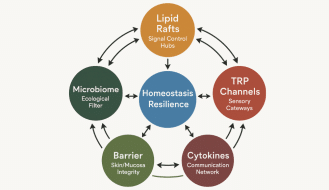The Difference Between Fish Oil & CoQ10
When it comes to supporting heart health, boosting energy, or enhancing overall wellness, CoQ10 and fish oil often come up in discussion. Both dietary supplements are popular for their health benefits, but they serve different roles in the body.
Fish oil supplementation provides essential omega-3 fatty acids, known for their powerful anti-inflammatory effects and heart-protective qualities. CoQ10, on the other hand, is a naturally occurring antioxidant that fuels energy production within our cells, particularly in organs like the heart that require high energy.
What is Fish Oil?

Fish oil is high in omega 3 fatty acids, which are beneficial for lowering blood pressure, reducing risk factors of heart disease, and reducing inflammation in the body.
Fish oil comes from the tissues of fatty fish and is known for being a rich source of omega-3 fatty acids, particularly EPA (eicosapentaenoic acid) and DHA (docosahexaenoic acid). These essential fats play an important role in many bodily functions, including supporting heart health, reducing inflammation, and maintaining brain function.
Understanding Fish Oil and Omega-3s
While fish oil contains the essential fatty acid omega-3, it’s worth noting that omega-3s are just one type of fat found within it. Fish oil includes a mixture of fats, with around 30% of its total content made up of EPA and DHA. These omega-3s are what make fish oil beneficial, especially for the majority of Americans, who do not consume enough fatty fish like salmon, sardines, or mackerel to meet their omega-3 needs.
Why EPA and DHA Matter
EPA and DHA are omega-3s that directly impact inflammation, cardiovascular health, and brain health. DHA is a primary component in the brain and eyes, contributing to cognitive health and visual function, while EPA helps reduce inflammation, benefiting conditions like joint pain or heart disease.
Whole Fish Oil vs. Omega-3 Concentrates
Many fish oil supplements on the market offer either whole fish oil or omega-3 concentrates. While omega-3 concentrates allow for higher doses of EPA and DHA, they can be less bioavailable, meaning the body may not absorb them as effectively.
Whole fish oils, particularly full-spectrum options, provide a natural balance of omega-3s along with other fatty acids, supporting overall wellness with minimal processing. For those who struggle to get enough omega-3s from their diet alone, a high-quality fish oil supplement like Omega Cure Extra Strength can help bridge the gap.
Health Benefits of Omega 3s
Omega-3 fatty acids are essential for maintaining many aspects of our overall health, with benefits spanning everything from brain and heart health to mental clarity. These fats, particularly EPA and DHA found in fish oil, have anti-inflammatory properties that support physical and mental wellness.
- Heart Health: Omega-3s are known for reducing risk factors of heart disease by improving cholesterol, lowering blood pressure, and reducing triglycerides (1). They decrease arterial stiffness, prevent plaque buildup, and support overall cardiovascular health (2).
- Brain Health & Cognitive Function: DHA supports brain cell structure and function, crucial for learning and memory. Diets rich in DHA and EPA may protect against cognitive decline and reduce the risk of Alzheimer’s and other neurodegenerative diseases (3).
- Joint Health & Inflammation: Anti-inflammatory effects of omega-3s relieve joint pain and stiffness, particularly in rheumatoid arthritis (4), often reducing the need for pain medications.
- Skin Health: Omega-3s promote skin hydration, reduce inflammation, and support cell integrity, benefiting conditions like eczema and psoriasis and protecting against UV damage (5).
- Longevity & Cellular Health: Higher omega-3 levels are associated with fewer chronic illnesses and longer lifespans. Omega-3s enhance cell membrane integrity, nutrient absorption, and gene expression for overall wellness (6).
What is CoQ10?

CoQ10 is helps support cellular energy, reduces oxidative damage, and can support heart health.
Coenzyme Q10, often called CoQ10, is an antioxidant naturally found in every cell of our bodies. It plays an essential role in energy production, particularly in the mitochondria—the parts of our cells responsible for generating energy.
Without sufficient CoQ10, cells cannot produce the energy they need to function efficiently, which can have widespread effects on health, particularly for organs with high energy demands, like the heart.
Health Benefits of CoQ10
CoQ10’s primary benefits come from its ability to support cellular energy, reduce oxidative stress, and protect heart health (7):
- Enhanced Cellular Energy: CoQ10 plays a key role in creating ATP, the molecule that fuels our cells. This energy boost helps with physical performance and supports the functions of organs that need energy to work at their best.
- Cardiovascular Support: It is well-documented that CoQ10 can support cardiovascular health. Studies suggest that it can help improve outcomes in conditions like heart failure, hypertension, and coronary artery disease.
- Reduction of Oxidative Stress: As an antioxidant, CoQ10 helps reduce free radical damage, protecting cells from damage that can lead to inflammation, aging, and chronic illnesses. This protective effect is especially helpful for managing conditions linked to oxidative stress, such as heart disease and neurodegenerative disorders.
- Potential Support in Statin Use: Statin medications, often prescribed for cholesterol management, can reduce natural CoQ10 levels in the body. Some studies suggest that CoQ10 supplementation may help reduce side effects associated with statins, such as muscle pain and weakness.
What is the Difference Between Omega 3 Fish Oil vs. CoQ10?
While both fish oil and CoQ10 have health benefits, they work differently in the body and serve unique functions. Fish oil provides omega-3 fatty acids, which our bodies cannot produce and must obtain through diet or supplementation. CoQ10, on the other hand, is an antioxidant that the body makes naturally. It plays a critical role in energy production, particularly within the mitochondria, the cell’s powerhouse.
Mechanism of Action
- Fish Oil (Omega-3s): EPA and DHA in fish oil reduce inflammation by blocking pro-inflammatory compounds and creating resolvins (8). This helps manage chronic inflammation, supports cardiovascular health, and improves blood vessel function.
- CoQ10 (Ubiquinone): CoQ10 aids cellular energy production by generating ATP in mitochondria. It also acts as an antioxidant, protecting cells from oxidative stress, which benefits heart health and vascular function by preserving nitric oxide for better circulation (9).
Differences in Health Benefits
Fish oil and CoQ10 each play unique roles in supporting health. Fish oil is beneficial for cardiovascular, brain, and joint health. Omega-3s help lower triglycerides, reduce blood pressure, and improve cholesterol, while also reducing inflammation, which benefits heart function and joint mobility. DHA, a key component in brain structure, supports cognitive health and mood stability, making fish oil valuable for maintaining heart, brain, and joint function.
CoQ10, on the other hand, is crucial for cellular energy production, particularly in energy-demanding organs like the heart. It supports ATP production, helping combat fatigue and enhancing physical endurance, and is particularly useful for individuals experiencing age-related energy declines.
As a powerful antioxidant, CoQ10 reduces oxidative stress, which is essential for heart health and for managing conditions related to cellular damage, such as diabetes (10).
Sources and Formulations
Since the body can’t produce omega-3s, we rely on fatty fish like salmon, mackerel, and trout, or supplements, to meet our needs (11). Fish oil supplements come in various forms—liquid, capsules, and pills—making it easy to tailor intake according to personal preference. Make sure you choose a high-quality, full-spectrum fish oil supplement that delivers adequate amounts of EPA and DHA, ensuring you’re supporting your health with the right dose of these essential omega-3s.
CoQ10
CoQ10, necessary for energy production and cellular protection, is naturally present in the body but declines with age. Dietary sources include meats, fish, and nuts, though food alone typically doesn’t provide enough to significantly boost levels (10). CoQ10 supplements, available as ubiquinone or the more absorbable ubiquinol, come in capsules, chewables, and liquids, making supplementation accessible for a range of needs.
When to Use Fish Oil vs. CoQ10
Should you take CoQ10 or fish oil to improve your overall health? Both fish oil and CoQ10 offer specific health benefits, but the best choice for you depends on your individual health goals and needs.
When to Take Fish Oil
Fish oil is ideal for those looking to support heart health, reduce inflammation, or improve cognitive function. With omega-3s like EPA and DHA, fish oil helps lower triglycerides, reduce blood pressure, and may lower heart disease risk. It also benefits brain health and offers anti-inflammatory relief for conditions like arthritis, especially if your diet lacks fatty fish.
When to Take CoQ10
CoQ10 is especially beneficial for those needing an energy boost, recovering from a heart attack, or managing diabetes (12). It aids cellular energy production, potentially enhancing physical performance and stamina. For heart health, CoQ10 supports recovery post-heart attack and may alleviate heart failure symptoms.
Should You Take Fish Oil and CoQ10 Together?
Taking CoQ10 and fish oil dietary supplements together is generally considered safe and can provide complementary benefits. If you’re considering adding both to your routine, here are the recommended dosages:
- Fish Oil Dosage: Aim for at least 2000 mg of EPA/DHA daily for optimal anti-inflammatory effects and to reach beneficial omega-3 levels, which can be particularly impactful for heart health.
- CoQ10 Dosage: Typical CoQ10 dosages range from 100 to 200 mg per day, although some individuals may benefit from higher doses, especially if managing specific health conditions or taking statins.
For many people, adding both CoQ10 and fish oil may help fill dietary gaps and address specific health needs. As always, consult your healthcare provider to personalize dosages and ensure these supplements align with your health goals.
References:
- Skulas-Ray AC, Wilson PWF, Harris WS, et al. Omega-3 Fatty Acids for the Management of Hypertriglyceridemia: A Science Advisory From the American Heart Association. Circulation. 2019;140(12). doi:https://doi.org/10.1161/cir.0000000000000709
- Yanai H, Masui Y, Katsuyama H, et al. An Improvement of Cardiovascular Risk Factors by Omega-3 Polyunsaturated Fatty Acids. Journal of Clinical Medicine Research. 2018;10(4):281-289. doi:https://doi.org/10.14740/jocmr3362w
- Wood AHR, Chappell HF, Zulyniak MA. Dietary and supplemental long-chain omega-3 fatty acids as moderators of cognitive impairment and Alzheimer’s disease. European Journal of Nutrition. 2021;61. doi:https://doi.org/10.1007/s00394-021-02655-4
- Simopoulos AP. Omega-3 fatty acids in health and disease and in growth and development. The American Journal of Clinical Nutrition. 1991;54(3):438-463. doi:https://doi.org/10.1093/ajcn/54.3.438
- Huang TH, Wang PW, Yang SC, Chou WL, Fang JY. Cosmetic and Therapeutic Applications of Fish Oil’s Fatty Acids on the Skin. Marine Drugs. 2018;16(8):256. doi:https://doi.org/10.3390/md16080256
- Surette ME. The science behind dietary omega-3 fatty acids. Canadian Medical Association Journal. 2008;178(2):177-180. doi:https://doi.org/10.1503/cmaj.071356
- Pollen K. Yeung PT. Coenzyme Q10 for Cardiovascular Prevention. Cardiovascular Pharmacology: Open Access. 2014;03(01). doi:https://doi.org/10.4172/2329-6607.1000e125
- Pc C. n-3 Polyunsaturated Fatty Acids, Inflammation, and Inflammatory Diseases. The American journal of clinical nutrition. Published June 1, 2006.https://pubmed.ncbi.nlm.nih.gov/16841861/
- Sood B, Keenaghan M. Coenzyme Q10. Nih.gov. Published January 30, 2024.https://www.ncbi.nlm.nih.gov/books/NBK531491/
- Mayo Clinic Staff. Coenzyme Q10. Mayo Clinic. Published November 10, 2020.https://www.mayoclinic.org/drugs-supplements-coenzyme-q10/art-20362602
- Mayo clinic. Fish oil. Mayo Clinic. Published August 10, 2023.https://www.mayoclinic.org/drugs-supplements-fish-oil/art-20364810
- Coenzyme Q10 Information | Mount Sinai – New York. Mount Sinai Health System.https://www.mountsinai.org/health-library/supplement/coenzyme-q10
Popular posts



Related posts






